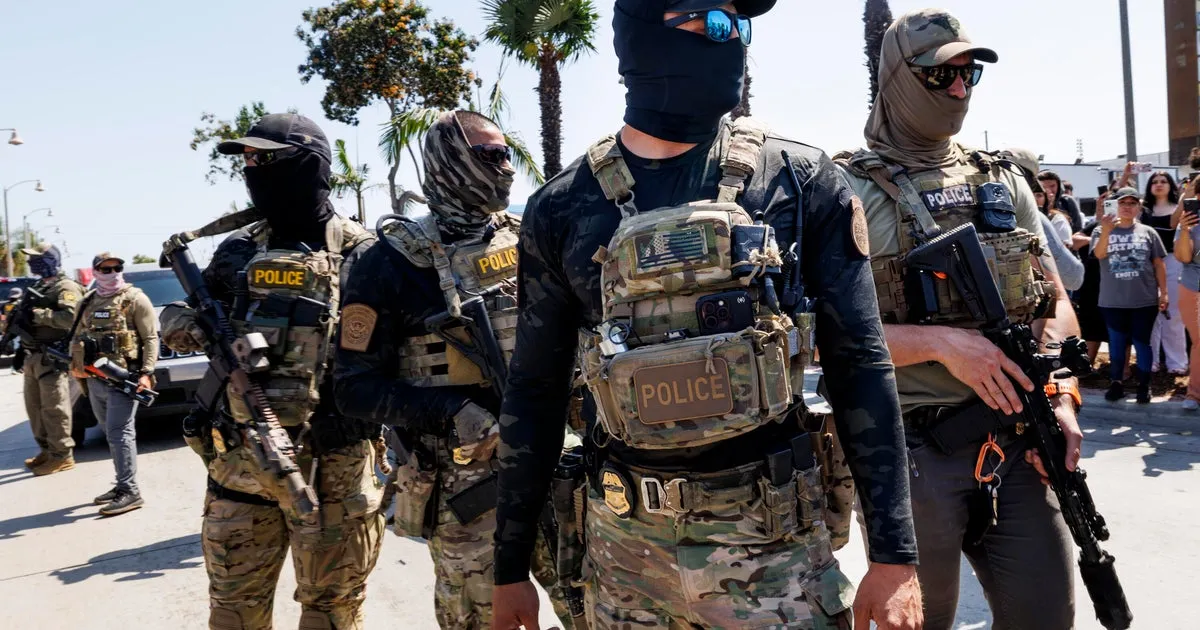
On Thursday, California lawmakers passed a significant piece of legislation aimed at increasing transparency among law enforcement officers. The bill, known as Senate Bill 627 or the No Secret Police Act, prohibits most local and federal law enforcement officers from covering their faces during operations, including those related to immigration enforcement. This bill was introduced by Democratic state Senators Scott Wiener of San Francisco and Jesse Arreguin of Berkeley in June, amidst heightened immigration enforcement actions stemming from President Trump's crackdown on illegal immigration across the state.
With a decisive vote of 28 to 11, the bill has now moved to Governor Gavin Newsom's desk for final approval. Senator Wiener emphasized that the primary goal of this legislation is to enhance transparency and bolster public safety by fostering greater trust between communities and law enforcement. He noted that the passage of this California bill has inspired similar legislative efforts across the nation, with proposals emerging in states such as Tennessee, Michigan, Illinois, New York, Massachusetts, and Pennsylvania.
In a statement reflecting the community's sentiment, Wiener remarked, "We have to stand up and say no to the secret police raining fear and intimidation on communities across California." He articulated that law enforcement should be easily identifiable, contrasting officers in masks with criminals who disguise themselves to commit crimes. Wiener asserted that amidst rising concerns about authoritarian tactics, California must hold accountable those who threaten community safety and restore public confidence in law enforcement.
During an exclusive interview on Face the Nation with Margaret Brennan in July, Todd Lyons, the acting director of ICE (U.S. Immigration and Customs Enforcement), acknowledged that while he is not an advocate for agents wearing masks during operations, he understands the safety concerns that lead to such practices. "If that's a tool that the men and women of ICE need to keep themselves and their family safe, then I will allow it," Lyons stated, addressing criticism regarding the lack of identification among ICE agents.
If signed into law by Governor Newsom, the No Secret Police Act will apply to local and federal law enforcement officers, as well as officers from other state agencies operating in California, with specific limited exemptions. The legislation will ban the use of masks, false whiskers, or any disguises intended to evade identification during public offenses. Supporters argue that this measure will help prevent impersonation of law enforcement, a growing concern within communities.
The bill includes a list of exemptions to address operational needs, such as:
SWAT teams Approved undercover assignments Motorcycle helmets Eyewear for protection against retinal weapons N95 medical or surgical masks Breathing apparatuses for toxic environments Weather-related masks Masks for underwater operationsDespite the support, some law enforcement officials have voiced concerns. Alan Wayne Barcelona, president of the California Statewide Law Enforcement Association, expressed opposition to the bill, stating that it undermines officer safety and fails to consider the critical role of anonymity in various operational scenarios, including undercover investigations.
On the same day, the California Legislature also passed Senate Bill 805, known as the No Vigilantes Act. Introduced by Democratic state Senator Sasha Renée Pérez of Pasadena and community leaders, this bill mandates that law enforcement officers clearly display their identification, including either their name or badge number. Pérez noted the necessity of such legislation, stating, "In a normal world, this legislation would be unnecessary and unheard of. But these are extraordinary times, and we must protect Californians from fear of police impersonation." The rising number of impersonation claims has highlighted the urgent need for consistent standards in law enforcement identification.